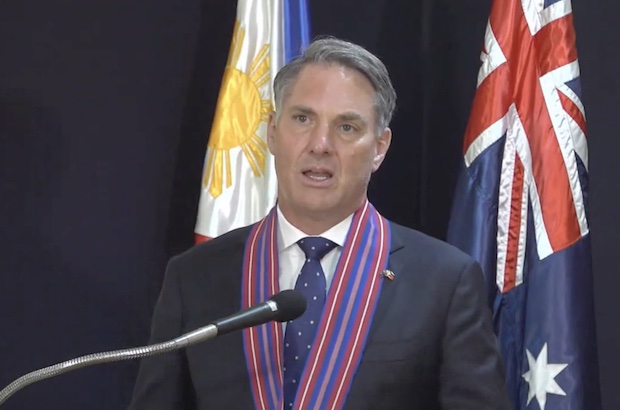Aussie envoy confirms joint patrol talks with PH, US, Japan

Australian Deputy Prime Minister Richard Marles, who is also the defense minister, speaks at a joint press briefing with Defense OIC Carlito Galvez Jr. on Wednesday, Feb. 22, 2023. (Photo from a video posted on the Facebook page of the Department of National Defense)
MANILA, Philippines — Canberra is keen on working with Manila, Washington, and Tokyo “in support of international law” as a tool for security and stability in international waters, Australian Ambassador to the Philippines Hae Kyong Yu said on Wednesday, confirming that the four governments were considering joint patrols in the South China Sea.
Yu said the possibility of group joint patrols was one of the topics discussed by Australian Defense Minister Richard Marles when he met with acting Defense Secretary Carlito Galvez Jr. last week.
“The conversations on the joint patrols with the US, Philippines and Japan in international waters are ongoing,” Yu told the Inquirer during a women’s football event in Makati City.
She added: “We do have the desire to work closely with our partners in support of international laws, like the Unclos (United Nations Convention on the Law of the Sea), in the South China Sea.”
While joint patrols in the disputed waters may invite China’s anger, according to Yu, such activities are not new to Australia, as it has done similar exercises with other allies, as have the United States and Japan.
Article continues after this advertisement“It is in the best interest of Australia as well to keep the waters free and open,” she stressed.
Article continues after this advertisementBut Yu acknowledged that no final decision had been reached in the discussions.
A Reuters report on Tuesday quoted Philippine Ambassador to the United States Jose Manuel Romualdez as saying that meetings have been set on the joint patrols and “probably we may have the Japanese and the Australians join in.”
“They would like to join in for joint patrols to make sure that there’s the code of conduct and there’s freedom of navigation,” Romualdez said, adding it was still “an idea under discussion.”
If the plan materializes, it will be Manila’s first time to take part in multilateral maritime patrols in the South China Sea, a move likely to infuriate Beijing, which claims most of the sea as its territory.
The Inquirer reached out to the Department of Foreign Affairs (DFA) and the Chinese Embassy in Manila for comment but did not immediately get a response.
Australia was one of the first nations to recognize the 2016 arbitral ruling which favored the Philippines’ rights over its 370-kilometer exclusive economic zone (EEZ) in the South China Sea, and invalidated China’s sweeping nine-dash-line claims in the region.
Conflict over Taiwan
China has refused to recognize the ruling and continues its aggressive activities in those waters, the latest involving its coast guard’s Feb. 6 laser attack on a Philippine Coast Guard vessel near Ayungin (Second Thomas) Shoal.
The Philippines maintains security partnerships with allies, including a mutual defense pact with the United States and a Visiting Forces Agreement with the United States and Australia.
Manila and Washington also recently agreed to have additional sites under the Enhanced Defense Cooperation Agreement (Edca) that allows the United States to preposition forces and equipment in strategic locations in the Philippines.
But senators on Wednesday expressed concern that such an arrangement might put the country in the middle of the conflict between China and the United States over control of Taiwan.
During a hearing of the Senate foreign relations committee, the chair, Sen. Imee Marcos, grilled defense and foreign officials over the establishment of more Edca sites.
“What is our fight with Taiwan? Why are we doing all the military exercises in northern Luzon, a stone’s throw or at least a boat ride from Taiwan? Then clearly, the new expanded Edca is addressing the escalation of tension in the Taiwan Strait, not Philippine interests,” Marcos said.
“We are therefore going to fight for another country, the US, is that correct, sir?” she added, addressing officials led by acting Defense Secretary Carlito Galvez Jr. and Foreign Secretary Enrique Manalo.
Senate Minority Leader Aquilino Pimentel III also cautioned the officials against aggressively pushing for the Edca.“If this (Edca) is preparation for a certain contingency anticipated by the US, that is no longer within the spirit and coverage of the Mutual Defense Treaty [with the US],” he said.
RELATED STORIES
PH, Australia explore doing joint patrols in WPS
Envoy: Japan, Australia may join patrols with US, PH
PH, US to restart joint patrols in South China Sea
For comprehensive coverage, in-depth analysis, visit our special page for West Philippine Sea updates. Stay informed with articles, videos, and expert opinions.